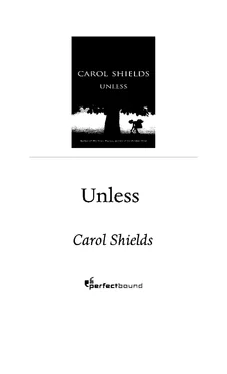Carol Shields - Unless
Здесь есть возможность читать онлайн «Carol Shields - Unless» — ознакомительный отрывок электронной книги совершенно бесплатно, а после прочтения отрывка купить полную версию. В некоторых случаях можно слушать аудио, скачать через торрент в формате fb2 и присутствует краткое содержание. Жанр: Современная проза, на английском языке. Описание произведения, (предисловие) а так же отзывы посетителей доступны на портале библиотеки ЛибКат.
- Название:Unless
- Автор:
- Жанр:
- Год:неизвестен
- ISBN:нет данных
- Рейтинг книги:4 / 5. Голосов: 1
-
Избранное:Добавить в избранное
- Отзывы:
-
Ваша оценка:
- 80
- 1
- 2
- 3
- 4
- 5
Unless: краткое содержание, описание и аннотация
Предлагаем к чтению аннотацию, описание, краткое содержание или предисловие (зависит от того, что написал сам автор книги «Unless»). Если вы не нашли необходимую информацию о книге — напишите в комментариях, мы постараемся отыскать её.
Unless — читать онлайн ознакомительный отрывок
Ниже представлен текст книги, разбитый по страницам. Система сохранения места последней прочитанной страницы, позволяет с удобством читать онлайн бесплатно книгу «Unless», без необходимости каждый раз заново искать на чём Вы остановились. Поставьте закладку, и сможете в любой момент перейти на страницу, на которой закончили чтение.
Интервал:
Закладка:
This is a familiar yet unique scene. The precise pattern will occur only once — us, here, this moment engraved in a layer of memory — a thought that stirs me to wonderment.
Such feelings come easily to me these days, and I know enough to distrust myself with these little ironic turnings, these fake jewels. The string section comes on somewhere behind my eyes. There is a sense of buoyancy, as though I’m being carried along on a tidal wave of sensation, borne forward. Precious and precarious, a bending, subtle wand of desire making itself known. Followed by a tightening of the throat, moistening of the eyes, awe for the beauty of ongoing life. Et cetera. Oh, God. This is insane, these errands, these visions, my stepping into cantilevered space and allowing myself to be tipped from skepticism to belief.
Twin babies in snowsuits. People hugging at the airport. Pet with his golden fur and brown-socketed eyes sniffing endearingly into the corners of the house, knowing something is wrong, something is missing. Boo hoo.
“She is such a lachrymose woman.” I once heard a man say that disdainfully about his sister; he might have been talking about me in my present state. But it’s just me, Reta Winters, pushing against what has become an observant loyalty to my habit of sadness. Stupid or shrewd; one or the other. It’s only temporary, a warped sense of rejoicing, une déformation — so says Danielle Westerman — but it’s somehow true, too. For here we are, together in this room at the public library with its old, worn wooden floors, held inside a little tick-tock of time.
And each of us has a life we’ll soon be going back to. Dinners will be waiting for us; what an odd and consoling thought. Elaborate full-course affairs or plates of Kraft Dinner or Greek salad from a Safeway tub. I’ve got two chickens roasting in the oven right now, enough for leftovers tomorrow; a potato casserole that just needs heating up, and the makings of a salad.
My, my, such a good woman, so organized, too.
Enough of that!
Yes, I must get home. A long day, yes. Rain, rain. The weather forecast. Goodbye. My umbrella, good heavens, I almost forgot. Yes, busy, busy. Parked just outside. Don’t really need. Still have the dog to walk. Yes, I will, of course I will. Thank you again, thank you both. You must be glad to see the end of a long day.
I want, I want, I want. don’t actually say these last words; I just bump along on their short, stubbed feet, their little dead declarative syllables — while buttoning up my coat and making my way home.
Nevertheless
We live on a steep hill. This is rolling country on the whole, so our rocky perch is a geological anomaly, chosen no doubt because it offered a firm foundation as well as a view.
The house is a hundred years old, a simple brick Ontario farmhouse that has been much added on to by its several previous inhabitants, and by us. It has weathered into durable authenticity, withstanding the scorchings and freezings of the Ontario climate.
People often ask me — I don’t know why — how many rooms we have, and each time this happens I go blank. This is something I should know, but don’t. It depends on what you call a room. Is a vestibule a room? Ours has a bright Indian rug, a bench, an engraving on the wall, a number of hooks for coats. The large square entrance hall has a Swedish wood-burning stove on the left-hand side, which we installed during the bitter winter of 1986 and which provides the kind of good, dry radiant heat required in our climate. And there’s space in this “hall” for several easy chairs, a telephone table, the oak floor laid with a soft, faded kilim, and in the corner a big blocky desk that Tom uses for personal correspondence — and yet this is not really a room. A hall is not a room; any real estate agent will tell you that. The dining room, off to the right, has a tiny sunroom adjoining it, which is more a cupboard than a room, a wicker settee, a tiny table, some hanging plants, a large squashy ottoman, a sense of opalescence and purity. The living room to the left has a deep bay window, almost a room in itself. Everything’s green and white or shades of teal, clear and, at least to my eye, luminous.
There’s a screened porch off the den, and above it another screened porch, what used to be called a sleeping porch. The room where I work is the old box room in the attic, also not officially a room, though the new skylight and cunningly suspended bookshelves make it feel like one. My office is what I call this space, or else my cubby — or, most often, the box room.
My life as a writer and translator is my back story, as they say in the movie business; my front story is that I live in this house on a hill with Tom and our girls and our seven-year-old golden retriever, Pet.
Each of our three daughters has a room of her own, Natalie in the south room and Christine in what we call the raspberry room, not because of the colour of the walls but because her window overlooks our flourishing raspberry patch. Norah, the eldest, has her bedroom at the end of the hall (she is not home at the moment, hasn’t been for months, in fact). The sweetest smell hovers in this room, wafting from the tulip-printed duvet or the warm white linen curtains at the windows. Tom and I have the north bedroom, which could really be called two rooms because of the little L-shaped anteroom off the end where Tom keeps his precious trilobite collection in a locked glass case. When the girls were babies they slept here in a crib, to be close to us at night. That crib is now in the basement, occupying a corner of another non-room, a half-finished space with rather sooty knotty-pine walls and painted cement floor, built probably in the late fifties by the McGinn family.
The McGinn House; that’s what our place is still called locally, though three or four tenants intervened between them and us, short-term renters who left scarcely any impression of themselves and, in fact, let the house go halfway to ruin.
The McGinns were the first non-farming family to live here. Mr. McGinn ran a second-hand furniture store in town, not very successfully by all accounts. It was during his tenure that the farm acreage was sold off, leaving just four acres for us, woods mostly, maple, sycamore, and a few ancient oaks, and a small apple orchard. I read recently that an English oak takes three hundred years to grow, then lives for three hundred years, then spends three hundred years dying. This thought gave me pause, or at least a lash of sentimental static that was not quite elaborated into a thought: the wonder that living oaken tissue could be so patient and obedient to its built-in triadic rhythm, responding to the tiny distortions of its oversized cells. Did it matter at which moment an oak heart decided to wither and call it a day?
I often think about the McGinn family. I never met them, but they linger nevertheless.
They left traces. I’ve asked Lois about the family, but she had little to do with them, not being one for neighbourliness. She is a great believer in “not imposing,” and at that time Tom was a very small boy, too young to play with the McGinn children. The two houses were well separated in those days by ghostly old lilacs and springy untrained stands of spirea.
When we moved in, the half-finished basement room had a freestanding bar at one end with a dark slate top, and we can only think they left it behind because it was too heavy for them to move, not worth the effort. In the deep drawer behind the bar we found a single large cocoa bean, waxed and beautiful and smelling exotically of oily dust. We kept it for years, though now it seems to have vanished. There was also an ancient cardboard box of Dance Dust. If you sprinkled a little on the floor, it made it slippery, just right for a sliding foxtrot.
Читать дальшеИнтервал:
Закладка:
Похожие книги на «Unless»
Представляем Вашему вниманию похожие книги на «Unless» списком для выбора. Мы отобрали схожую по названию и смыслу литературу в надежде предоставить читателям больше вариантов отыскать новые, интересные, ещё непрочитанные произведения.
Обсуждение, отзывы о книге «Unless» и просто собственные мнения читателей. Оставьте ваши комментарии, напишите, что Вы думаете о произведении, его смысле или главных героях. Укажите что конкретно понравилось, а что нет, и почему Вы так считаете.












